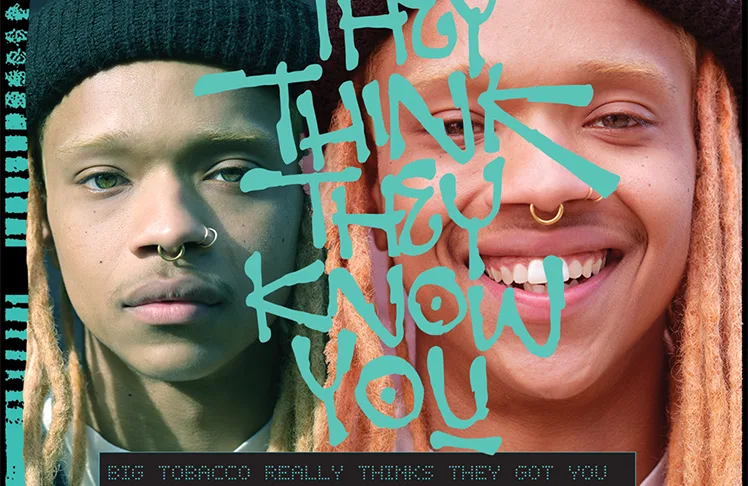
The Washington State Department of Health (DOH) is increasing its efforts to combat the leading cause of preventable deaths among Black/African Americans in the United States: the use of tobacco, particularly menthol tobacco. With its addictive nature and aggressive marketing towards people of color, menthol tobacco poses a significant health risk that the DOH believes demands immediate attention.
“For decades, the tobacco industry has targeted the Black/African American population,” says Deesha Connor, Health Educator for the Washington State Department of Health. “Today is no different, and we are greatly impacted by menthol tobacco. In Washington state, 56 percent of smokers use menthol products.”
Menthol tobacco is often marketed with “enhanced flavors and a smooth” taste, leading to misconceptions that it is healthier than regular tobacco due to its ability to suppress coughing and reduce the perceived harshness of smoke. However, in reality, menthol increases the effects of nicotine on the brain, making tobacco addiction more challenging to overcome.
“The issue with menthol is that it provides a cooling sensation to the user, creating a false sense of stress relief. However, it actually makes it harder for us to quit using tobacco,” explains Connor. “We know that tobacco-related health issues are the leading cause of preventable deaths in the Black community.”
In an attempt to expose the marketing efforts and targeted tactics, DOH has launched its latest campaign: “They Think They Know You.” The campaign encourages individuals to be aware of how they are being targeted as customers based solely on the color of their skin.
According to Maya Anderson of the Anchor Group, the marketing/advertising/public relations agency for the campaign, the Black/African American population is disproportionately affected by menthol products, which are more heavily advertised, widely available, and priced cheaper than in other communities. In fact, stores in predominantly Black/African American neighborhoods are ten times more likely to display tobacco ads compared to areas with fewer Black/African American residents.
“DOH’s latest campaign, ‘They Think They Know You,’ is a response to the tobacco industry’s blatant targeting of Black/African American communities,” says Anderson. “For more than 60 years, they have made efforts to get us hooked on menthol tobacco, which is more addictive and ultimately more harmful due to its ability to mask some adverse effects associated with smoking.”
The “They Think They Know You” campaign, currently operating statewide, has been designed to raise awareness among the Black community,” Connor states. “People in the Black community are already well aware of the harms of tobacco and that we are being targeted by various industries, not just tobacco.”
The marketing campaigns for menthol tobacco products apply data to determine the most effective ways to entice Black/African Americans to purchase their products. According to Anderson, they even provide financial support to community groups, events, schools, churches, and social justice organizations. Celebrities, church officials, and politicians are also approached for partnerships to support their cause. These efforts aim to tear down communities into a formula that tobacco companies can ill-use to sell more products.
“They think they know you. Your community. The places you go and the way that you spend your time,” states the campaign’s voiceover in the video. The camera captures a young Black male, reminiscent of someone seen walking in any neighborhood, getting a haircut. Information about him, including his name, age, and favorite music, floats around him.
“With this campaign, we want to draw attention to the fact that we are being targeted, and they are profiting from us regardless of the health outcomes,” says Connor. “We also want to highlight the fact that these preventable illnesses, diseases, and ultimately deaths are caused by the tobacco industry.”
According to officials, DOH’s campaign serves as a call to action for Washington’s Black/African American community. The campaign video concludes with the voiceover declaring, “They think they got you all figured out… Show them they’re wrong.”
“They Think They Know You” represents the initial step in the DOH’s efforts to shed light on the effects of menthol tobacco on Black/African American Washingtonians. In addition, a focus group study was conducted to gather feedback from community members directly affected by menthol tobacco.
“This is just our first step to get going,” explains Connor. “We hope to continue building on this campaign. Through the campaign, we direct people to our website, www.theythinktheyknowyou.org, where they can find resources and cessation support to help them quit. We also provide additional resources for mental health, including counselors and mental health professionals who can address the underlying reasons for using these products.”
“My message to our community is that we are so much more than a people to be manipulated,” says Anderson. “We have opportunities to unite around a common cause and support one another. Whether you are a current or former smoker or want to support a loved one, there’s a message from this campaign for everyone.”

